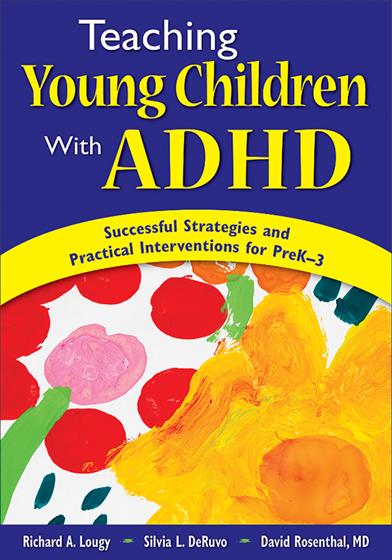Foreword by Meredith Cathcart
Preface
Acknowledgments
About the Authors
1. Yes, ADHD Is a Real Disorder!
Myth or Fact?
Diagnostic Criteria
Manifestations of ADHD
Prevalence of ADHD
Recognizing and Understanding ADHD in Young Children
What Causes ADHD?
Creating an Optimal Learning Environment
Summary
2. Recognizing ADHD: Primary Symptoms and Common Impairments
Inattention
Hyperactivity
Impulsivity
Other Behaviors Often Seen in Children With ADHD
Impairments in Executive Functioning
Temperament and ADHD
Summary
3. Developing and Reinforcing Appropriate Social Skills
Preschool and Elementary School as the Training Ground
What Are Social Skills and Why Are They So Important?
Social-Skills Development
Strategies That Support Social Skill Development
Five Problem-Solving Areas That Challenge Children With ADHD
Suggestions for Reinforcing Appropriate Social Behaviors
Challenging Settings for Children With ADHD
Summary
4. Help, This Kid Is Driving Me Crazy!!: Proactive Classroom Management and Positive Behavior Supports
Developing a Personal Philosophy of Behavior Management
Analyzing Behavior
Putting the Strategies to Practice
Summary
5. How Do I Teach This Kid? Classroom Strategies to Support All Learners
Classroom Success Is Possible
Treating Children With ADHD Fairly
Defining the Objective of the Lesson
The Differentiated Classroom
Making Appropriate Accommodations
Beyond Accommodations and Interventions: The Special Education Referral
Learning Disabilities
Other Health Impaired
Summary
6. Why Is Writing So Hard? Specific Strategies to Develop Writing Skills
Why Writing Is So Hard
Teaching Early Writing
Analyzing Writing Tasks
Scaffolds for Writing Success
The Dreaded Book Report!
The Even More Dreaded Written Report
Summary
7. What Teachers Should Know About Medication
What Medications Are Most Commonly Used to Treat ADHD?
What Changes Can I Expect to See With My Students on Stimulants?
Do Stimulants Cure ADHD? How Do These Medicines Work?
How Long Does a Child With ADHD Need to Be on Medication Before It Works?
How Will I Know If My Student Is Over-Medicated?
If the Medicine Works, Does That Confirm That the Diagnosis of ADHD Is Correct?
What Are the Possible Side Effects of Stimulants That My Student Might Experience?
What Information From Teachers Is Helpful to Doctors?
Are Stimulants Addictive?
Can Stimulants Lead to Problems With Abuse of Other Drugs?
Are There Particular Kids Who Would Be Expected to Do Poorly on Stimulants?
Are There Children Who Need to be on Medication Only at School?
Are there Problems With Adverse Drug Interactions if a Child Is on a Stimulant?
I've Heard That Kids Can Become Psychotic on Stimulants. Is It True?
Can Stimulants Be Used by Children Younger Than Age 5?
My Students Used to Do Well on Ritalin, but Now It Doesn't Seem to Work. What's Going On?
Are There Any Good Natural Remedies Available for Treating ADHD?
One of My Students Is on Prozac. Is This Commonly Used in Young Children With ADHD?
Do Medications Help Learning Disabilities?
One of My Students Is Very Defiant and Oppositional. Will Medications Help With This?
Summary
8. Communicating Effectively With Parents
Parents: The Most Important Resource
Respect and Acknowledge the Challenges Parents Face
Criticism Is the Least Effective Form for Change
ADHD as an "Excuse"
Helping Parents Separate Enabling From Supportive Decisions
When It Seems a Child Might Have ADHD
When Parents Don't Disclose That Their Child Is Taking Medication
Regular Communication Is Critical
Summary
9. Taking Care of Yourself
Recognizing the Signs of Stress
Suggested Ways to Lower Stress
Resource A: Recognizing ADHD in Preschool and Primary Grades: Real Profiles
Resource B: Other Disorders Sometimes Associated With ADHD
Resource C: Childhood Disorders and Conditions That Can Mimic ADHD in Young Children
Resource D: Recommended Books for Teachers
Resource E: Useful Web Sites
References
Index




